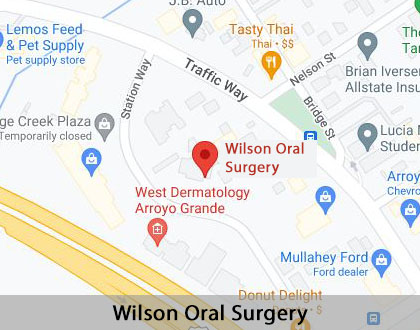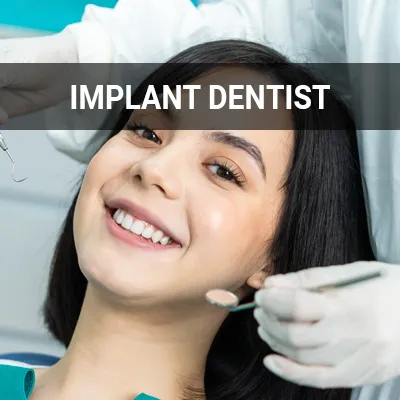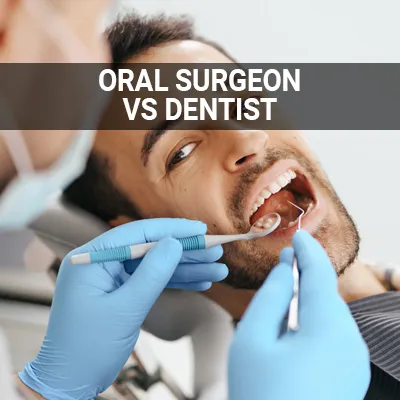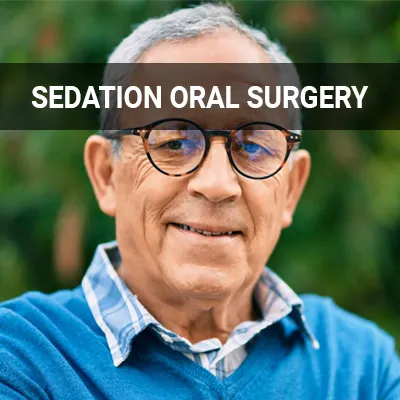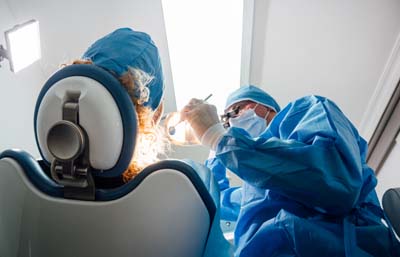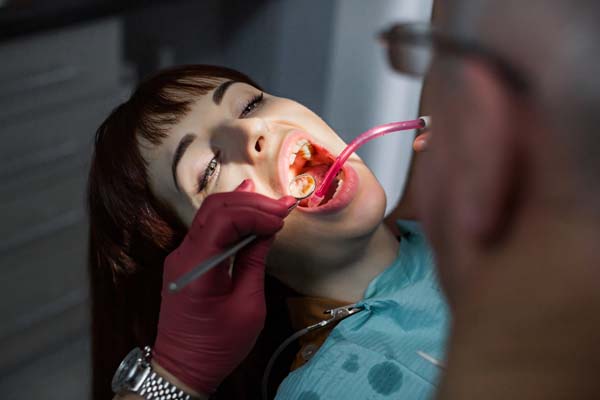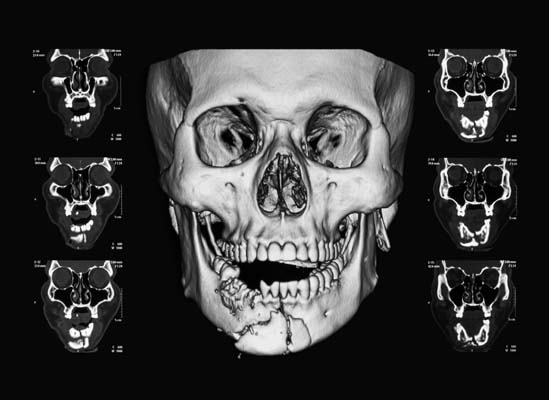Oral Surgery Arroyo Grande, CA
Oral surgery can address several different dental issues that have persisted over time. This solution may be able to address any jaw, bone, or teeth irregularities. If you have chronic dental problems that have not responded to non-invasive treatment, oral surgery may be right for you.
Oral surgery is available at Wilson Oral Surgery in Arroyo Grande and the surrounding area. For many patients, oral surgery is the solution they need after other dental treatments have failed. Call us today at (805) 476-2567 to learn more and schedule an appointment.
Understanding Oral Surgery
Oral and maxillofacial surgery deals with diagnosing and treating diseases, injuries, and defects involving the hard and soft tissues of the oral and maxillofacial region. "Oral" refers to the mouth, and "maxillofacial" refers to the jaw and face. Since the field may address these regions' aesthetic and functional areas, there are many different types of oral and maxillofacial surgeries.
Oral surgery is a long-established and well-researched area of study that is safe when conducted by a qualified professional. Our oral surgeon has the necessary credentials and experience to use various surgical techniques to help patients and their oral health.
“Oral and maxillofacial surgery deals with diagnosing and treating diseases, injuries, and defects involving the hard and soft tissues of the oral and maxillofacial region.”
Reasons for Oral Surgery
Oral surgery may help with several conditions. Some of the most common include:
- Impacted Teeth. Teeth are “impacted” when they become trapped between the jawbone and the gum tissue. Usually, this happens because the tooth has not emerged in proper alignment or entirely through the gum line. Generally, oral surgeons will recommend patients have these removed.
- Orthodontics. Oral surgery is sometimes necessary when braces are not enough to correct malocclusion (a misaligned bite). In such cases, a dental professional works with a surgeon to build a personalized treatment plan for the patient’s orthognathic surgery (corrective jaw surgery).
- Tooth Loss. Losing natural teeth can erode the jawbone over time, making deterioration an inevitability. Dental implants can prevent this from happening by anchoring the false teeth to the jawbone and stabilizing them.
It is important to remember that the above list is not exhaustive. Patients should consult with a professional to ensure which treatment option is right for them.
“Patients should consult with a professional to ensure which treatment option is right for them.”
Preparing for Oral Surgery
Oral surgery can be a complicated process. Taking a few easy steps can help simplify the process. Patients should maintain open and honest channels of communication with their dental professional at all times while working with the oral surgeon. There is no shame in asking questions. Being informed about what is going to happen and why can do a great deal to assuage any fears.
Those who will undergo sedation should not eat or drink anything, including water, after midnight the evening before surgery. Fasting prevents the chances of aspiration, a rare complication of anesthesia in which the lungs fill with the contents of the stomach. However, a small sip of water to take medication during the fast is permissible.
“Fasting prevents the chances of aspiration, a rare complication of anesthesia in which the lungs fill with the contents of the stomach.”
Check out what others are saying about our dental services on Yelp: Oral Surgery in Arroyo Grande, CA
What to Expect from Oral Surgery
Many patients find it benefits them to arrive at least 20 minutes early on the day of the surgery, allowing them to complete any paperwork and relax. Additionally, patients with removable dental devices should come with a container to store them in during surgery.
Patients who will be undergoing sedation should arrive wearing loose, short-sleeved clothing to assist staff in taking vital signs and administering the IV. It may also be necessary for nurses to put blood pressure cuffs on the patient to monitor them during the procedure. Our oral surgeon will go over all of the steps in the process during the consultation.
“Many patients find it benefits them to arrive at least 20 minutes early on the day of the surgery, allowing them to complete any paperwork and relax.”
Questions Answered on This Page
Q. Why do patients need oral surgery?
Q. How should patients prepare for their oral surgery day?
Q. What should patients expect on the day of surgery?
Q. What are some tips for a successful recovery?
People Also Ask
Q. Why would a dentist refer a patient to a specialist for dental implant surgery?
Q. How is an oral surgeon different from a general dentist?
Q. What are the different types of sedation?
Q. What happens during a wisdom tooth extraction?
Q. What is root canal treatment?
Q. What is the duration and success rate of dental implant treatment?
Recovering from Oral Surgery
Patients should plan to spend the day resting after oral surgery. The drowsiness of the sedative will likely last all day, making it important for patients to avoid doing anything that requires concentration. Patients should also refrain from straining to avoid dislodging any blood clots and causing bleeding. They should also keep their heads elevated whenever they are lying down.
Above all, it is crucial to follow the surgeon's instructions for the patient’s individualized treatment plan. We strongly encourage patients to call our oral surgeon and office immediately if they contract a fever, develop pus, or notice their swelling and bruising getting worse after three days.
“The drowsiness of the sedative will likely last all day, making it important for patients to avoid doing anything that requires concentration.”
Frequently Asked Questions
Q. How long will my face stay swollen after oral surgery?
A. Facial swelling is likely in the first 24 hours following oral surgery. Typically, this lasts for five to seven days, with varying degrees of intensity. Once the swelling has subsided, you will probably notice some bruising. This should fade considerably by the 10-day mark.
Q. When can I return to my normal diet after oral surgery?
A. Most patients can return to their regular diet about a week after oral surgery. This is a gradual change, and you should avoid any spicy or acidic foods until then. You will need to stick to liquids and soft foods for the first two days following surgery. You can start incorporating low-chew foods on day three.
Q. What causes a "dry socket" after oral surgery?
A. "Dry sockets," or alveolar osteitis, are blood clots that appear in extraction sites and break down prematurely. These usually result from overexertion, smoking, and poor oral hygiene during the postoperative period. Sometimes, they happen without a clear cause. Symptoms include bad breath, foul odor and taste, and increased pain. If you suspect you have developed a "dry socket," contact our oral surgeon immediately.
Q. Is oral surgery painful?
A. Patients are under anesthesia during oral surgery, meaning they will not feel any pain during the procedure. However, you will likely feel some pain and discomfort after surgery once the anesthetic has worn off. Our oral surgeon can give you recommendations or prescribe appropriate medication to help manage this pain.
Q. Can I drive myself to and from my oral surgery?
A. No. Patients should make plans for someone they trust to drive them to and from the procedure. Anesthetics and sedatives can negatively affect one's ability to drive, making it dangerous to be on the road. Our oral surgeon will go over the necessary steps patients need to take before and after the surgery.
Start Feeling Better – Visit Us Today
By visiting us as soon as possible, our team can help get you the professional treatment you need. Instead of waiting around and allowing the symptoms to get worse, we can provide you with treatment options.
Learn More Today
Sometimes, only an oral surgeon can adequately address your dental issues. We at Wilson Oral Surgery may be able to help. Call our Arroyo Grande office today at (805) 476-2567 to learn more and schedule an appointment.
Helpful Related Links
- American Dental Association (ADA). Glossary of Dental Clinical Terms. 2023
- American Academy of Cosmetic Dentistry® (AACD). Home Page. 2023
- American Academy of Maxillofacial Prosthetics. American Academy of Maxillofacial Prosthetics. 2023
- American Association of Oral and Maxillofacial Surgeons. American Association of Oral and Maxillofacial Surgeons. 2023
- American College of Oral and Maxillofacial Surgery. American College of Oral and Maxillofacial Surgery. 2023
- National Cancer Institute (NCI). National Cancer Institute (NCI). 2023
- WebMD. WebMD’s Oral Care Guide. 2023
About our business, license, and website security
- Wilson Oral Surgery was established in 1990.
- We accept the following payment methods: American Express, Cash, Check, Discover, MasterCard, and Visa
- We serve patients from the following counties: San Luis Obispo County
- We serve patients from the following cities: Arroyo Grande, Oceano, Pismo Beach, Callender, Nipomo, Grover Beach, San Luis Obispo, and Shell Beach
- CA (License #53295). View License Information and Specifics
- National Provider Identifier Database (1578736013). View NPI Registry Information
- Norton Safe Web. View Details
- Trend Micro Site Safety Center. View Details
Back to top of Oral Surgery

